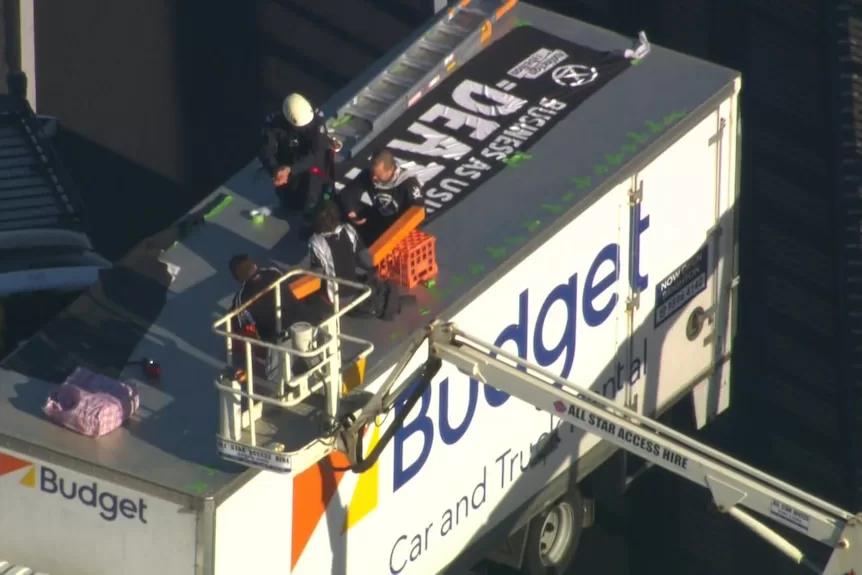Two environmental activists have been jailed for causing major traffic disruptions in Melbourne, after they used a rental truck to block the West Gate Bridge on Tuesday.
Extinction Rebellion members Deanna “Violet” Coco, 33, and Bradley Homewood, 51, were each ordered to spend 21 days in prison after pleading guilty to charges of public nuisance and intentionally obstructing police.
A third protester, 68-year-old Joseph Zammit, was released on bail, with his case adjourned to April 16.
Angry about a lack of government action on climate change, the group stopped the truck on the West Gate Bridge — blocking several lanes — before climbing on top of the vehicle and lighting a flare.
During an evening court session, Magistrate Andrew McKenna was critical of the trio’s actions, which led to peak hour delays on one of Melbourne’s busiest traffic routes.
“It just seems to me blind pursuit of a cause, irrespective of the consequences for others,” he said. “It was quite unacceptable in every sense.”
Magistrate McKenna said while the group wanted to raise awareness of climate issues, Tuesday’s stunt would have produced “the opposite reaction among most of the community”.
He said a prison term for Coco and Homewood was the only suitable punishment, given the pair had prior history of public nuisance.
The magistrate described the 21-day sentence as “mild, modest and almost inadequate”, given the level of disruption and the maximum penalty for the offending, which is five years in jail.
In 2023, Coco was sentenced to 15 months’ jail for blocking the Sydney Harbour Bridge, although the punishment was later reduced to a 12-month corrections order.
Prosecutor Geoff Adams told the Melbourne Magistrates Court that the court needed to impose a penalty that would send a message to Coco and other would-be unlawful protesters.
“It’s becoming a career for the accused, in causing a public nuisance,” he said.
Earlier, Mr Adams said the protest caused “catastrophic inconvenience and delay” to thousands of people, and disrupted emergency services who would have needed to respond to critical incidents.
When Coco addressed the court, she offered her “sincere apologies” for inconveniencing others and acknowledged she had “a big rap sheet”.
However she said her group needed to take “unprecedented” steps to draw attention to their cause, likening their actions to those who once lobbied for women’s voting rights and an eight-hour work day.
“I’m here because I care about life. Not here because I am gaining anything personally,” she said.
“What is coming is so dangerous that we need to sound the alarm and make sure that people understand the threat that we face.”
Mr Homewood echoed her sentiments.
“Climate breakdown will be much more of an inconvenience than anything that happened today,” he said.
Mr Zammit initially told the court he would also plead guilty to charges of public nuisance and intentionally obstructing police, but then changed his mind when he disagreed with allegations prosecutors read out to the court.
Ahead of his next court date, Mr Adams said prosecutors would not be calling for a term of imprisonment for Mr Zammit.
Magistrate McKenna told Mr Zammit citizens elected governments to make important decisions on issues like climate change.
“You can’t disregard the law to your advantage, even if you think it’s a worthy cause,” he said.
